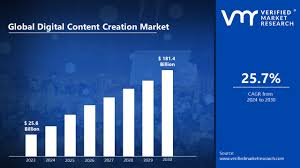Navigating the Evolving Content Creation Market in the UK
The Growing Content Creation Market
In today’s digital age, content creation has become a vital component of marketing strategies for businesses across various industries. The demand for high-quality, engaging content is on the rise as companies strive to connect with their target audience and stand out in a crowded online landscape.
Content creation encompasses a wide range of formats, including articles, blog posts, videos, social media posts, infographics, podcasts, and more. Each type of content serves a specific purpose in engaging and informing consumers, driving traffic to websites, and ultimately converting leads into customers.
The content creation market has seen significant growth in recent years, with businesses investing more resources into creating compelling and relevant content. This trend is driven by the increasing importance of digital marketing and the shift towards online consumer behaviour.
Content creators play a crucial role in helping businesses achieve their marketing goals. They are skilled at crafting messages that resonate with the target audience and can adapt their style to suit different platforms and mediums. Whether it’s creating SEO-optimised blog posts or producing visually appealing videos for social media, content creators have the expertise to deliver engaging content that drives results.
As the content creation market continues to evolve, businesses must stay ahead of trends and embrace new technologies to remain competitive. Automation tools, AI-driven analytics, and personalised content strategies are just some of the innovations shaping the future of content creation.
For businesses looking to enhance their online presence and engage with customers effectively, investing in quality content creation is essential. By partnering with skilled content creators who understand your brand values and target audience, you can create compelling narratives that resonate with consumers and drive business growth.
Exploring the Content Creation Market: Key Questions and Insights for Businesses
- What is content creation and why is it important for businesses?
- How can businesses benefit from investing in content creation?
- What are the different types of content that businesses can create?
- How do businesses measure the effectiveness of their content creation efforts?
- What role do content creators play in a company’s marketing strategy?
- What are some emerging trends in the content creation market?
What is content creation and why is it important for businesses?
Content creation refers to the process of producing engaging and valuable content for online platforms, such as websites, social media, and blogs. It involves creating various forms of content, including articles, videos, infographics, and more, with the aim of attracting and engaging target audiences. Content creation is crucial for businesses as it helps them connect with their customers, build brand awareness, drive website traffic, and ultimately increase sales. By consistently creating high-quality and relevant content that resonates with their audience, businesses can establish themselves as industry leaders, foster trust with consumers, and differentiate themselves from competitors in a crowded digital landscape. In essence, content creation is a powerful tool that enables businesses to communicate their message effectively and achieve their marketing objectives.
How can businesses benefit from investing in content creation?
Businesses can benefit significantly from investing in content creation as it plays a pivotal role in enhancing brand visibility, engaging target audiences, and driving conversions. High-quality and relevant content can establish businesses as industry leaders, build credibility and trust among consumers, and differentiate them from competitors. By creating valuable content that educates, entertains, or inspires their audience, businesses can attract more traffic to their website, improve search engine rankings, and ultimately increase lead generation and sales. Investing in content creation allows businesses to connect with their customers on a deeper level, foster long-term relationships, and ultimately achieve sustainable growth in today’s competitive digital landscape.
What are the different types of content that businesses can create?
Businesses have a wide array of options when it comes to creating content to engage their audience effectively. Some common types of content include articles, blog posts, videos, social media posts, infographics, podcasts, e-books, case studies, whitepapers, webinars, and email newsletters. Each type of content serves a specific purpose in conveying information, building brand awareness, driving traffic to websites, and nurturing relationships with customers. By diversifying their content creation strategy and tailoring the content to suit their target audience’s preferences and behaviours, businesses can maximise their reach and impact in the competitive digital landscape.
How do businesses measure the effectiveness of their content creation efforts?
Businesses measure the effectiveness of their content creation efforts through various key performance indicators (KPIs) that align with their marketing objectives. Common metrics include website traffic, engagement rates, conversion rates, social media shares, lead generation, and customer retention. By analysing these KPIs, businesses can gain insights into the impact of their content on audience behaviour and business outcomes. Additionally, tracking metrics such as click-through rates, time spent on page, and bounce rates provides valuable data to evaluate the quality and relevance of the content being produced. Through continuous monitoring and analysis of these metrics, businesses can refine their content strategies to ensure they are delivering meaningful results and driving ROI.
What role do content creators play in a company’s marketing strategy?
Content creators play a pivotal role in a company’s marketing strategy by crafting compelling and relevant content that resonates with the target audience. They are skilled at creating various types of content, such as articles, videos, social media posts, and more, to engage consumers and drive traffic to the company’s website. Content creators understand the importance of storytelling and brand consistency, helping to strengthen brand identity and build trust with customers. By delivering valuable and engaging content tailored to different platforms and mediums, content creators contribute to increasing brand awareness, generating leads, and ultimately converting prospects into loyal customers. Their expertise in creating impactful content plays a significant role in shaping a company’s online presence and driving business growth in today’s competitive digital landscape.
What are some emerging trends in the content creation market?
In response to the frequently asked question about emerging trends in the content creation market, businesses are witnessing several key developments that are shaping the industry’s landscape. One notable trend is the increasing focus on interactive and immersive content experiences, such as augmented reality (AR) and virtual reality (VR) technologies. Additionally, the rise of user-generated content and influencer collaborations is transforming how brands engage with their audiences. Furthermore, the demand for personalised and data-driven content strategies is driving the adoption of AI-powered tools for content creation and distribution. These emerging trends highlight the dynamic nature of the content creation market and underscore the importance of staying ahead of innovations to create engaging and impactful content.










